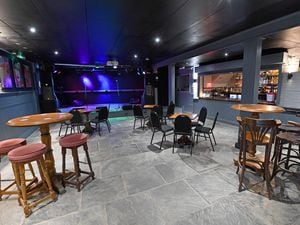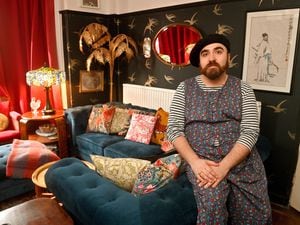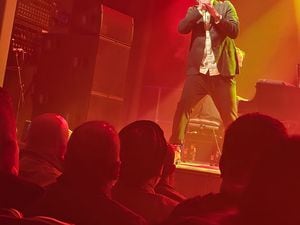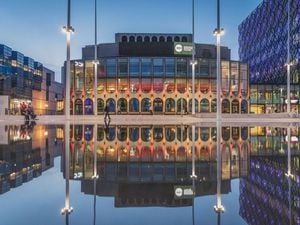Interview: Michael Portillo speaks railways political career and Jeremy Corbyn ahead of Wulfrun Hall appearance in Wolverhampton
Despite losing his seat as an MP, Michael Portillo's failing was a blessing in disguise and led to a most enjoyable time travelling the world on trains...
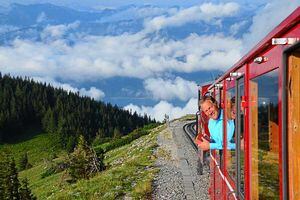
His career went into the sidings on the day Tony Blair swept to power. Michael Portillo thought the game was up on a long, dark night in 1997 when he lost his safe Enfield Southgate seat at the General Election.
Michael was intrinsically linked to Thatcherism – a philosophy that had been roundly rejected by the electorate as it looked for political change.
And his defeat was the most memorable event of a remarkable evening. Dubbed the 'Portillo Moment', one man's tragedy captivated the nation.
Michael had no Plan B.
And yet, remarkably, the man who was dumped by the nation is now a national treasure. Though his politics were rejected, his personality was not.
His charming manner was perfect for broadcasting and he was offered a range of TV and radio programmes. The concept of a once-unpopular Tory talking about trains might sound like car crash TV. But Michael made it work.
And now, 19 years on from his election defeat, he's made more than 200 entertaining and informative programmes about transport, culture and history.
His phoenix-like rise might provide food for thought for other politicians going through a rough patch. Jeremy Corbyn, for instance, who is facing a leadership challenge and might also lose his seat as part of a Boundary Commission review, might find a new career too.
Michael is sure Jeremy couldn't win an election.

"Well, I don't think that will ever happen, no. And I also think it looks like the 500,000 Labour members will only wake up to that very slowly," he says.
"They seem full of enthusiasm and even believe he can win the coming election. I don't think he will win.
"But I think what these activists think is that one day, sooner or later, Labour will be re-elected, even if it is set off towards the left and even if that day is a long way away.
"That analysis might be right. The Tories can't be in forever. At some point the electorate will look for an alternative. But it remains to be seen whether Labour will be that alternative or whether another will emerge: it might be UKIP, it might be the Liberals, I don't know."
And were you the best Prime Minister this country never had? He laughs again, refusing to be bowled over by flattery or satire but sufficiently polite to answer: "Well, probably not. Being the best Prime Minister this country did not have would be an easy thing to be."
Michael – because, let's face it, he's our friend and now we're on first name terms – will answer similar questions, as well as many that are far more serious, when he visits Wolverhampton's Wulfrun Hall on October 31. He's hitting the road for his spoken word show: Life – A Game Of Two Halves.
He'll explain how it took him little more than 10 years to get a seat in the Commons. And he'll reflect on the way his rise in power and esteem brought him to a point where he was the favoured leader of his party and a possible future PM.
Michael's track record suggested he was a privileged friend of the rich and famous who had little or no understanding of the ordinary citizen. But then came the fall. In 1997, his general election defeat was viewed as the pivotal result of the evening.
Remarkably, since leaving the House of Commons, he's confounded all expectations. Michael has endeared himself to many with his obvious respect for solid workmanship and creative energy, as found in our great Victorian railways. He's shown himself to be in touch with the toil of the working man as well as the underprivileged (Michael becomes a Single Mum) and the troubled (Death of a School Friend), both BBC documentaries. A historian at heart, he has used trains as a means of reflecting on changes in our society.
The result – a 17.4 per cent swing to Labour – shocked a nation, and was the first indication that the Conservative Government was about to be voted out of office for the first time in 18 years.
Over time it became known as 'the Portillo moment' and has entered the mainstream as a metaphor for any sudden change in fortunes.
It even has its own Wikipedia page, and is often dragged out by political commentators whenever the chance arises.
We had one early on in the EU referendum vote, when Sunderland voted Leave by such an unexpectedly high margin that everyone started to realise that Brexit was a real possibility.
Back in 1997, in a matter of minutes from the vote being declared, Michael went from being the darling of the Tory party and a potential future Prime Minister, to an unmitigated failure.
The common consensus was that he would simply fade away from the public eye, but instead he bounced back, serving as the MP for Kensington and Chelsea for six years before retiring from politics in 2005.
And in the midst of his resurgence he managed to forge a second career as a television personality.
While his path is one frequently trodden by politicians looking to earn a buck away from the House of Commons, Portillo-as-presenter is a strange and beautiful beast.
Let's take his latest series Great American Railroad Journeys.
The synopsis is simple: It's Michael Portillo. He's travelling across America. He's on a train.
It is precisely the type of show that would usually have us cursing the BBC's exorbitant licence fee, yet many found the entire series utterly compelling.
Armed with a guidebook to the US that was written in 1879, Portillo embarked on an odyssey that was always informative and at times hilarious.
Many of the best things happen when he gets off the train.
In Pennsylvania he dons an American Football kit and gets a crash course in Gridiron that involves him being taught how to grunt.
On Broadway a beaming Michael chomps on a burger and sups beer while he's given a personalised performance of the Chattanooga Choo Choo.
In the Catskill Mountains he glides through the trees on a zip-wire, while another episode sees him bounding along on what appears to be a pony and trap with members of the Amish community.
But it's the minor details that make his shows so much fun to watch, such as his penchant for speaking to the camera with one of his trademark brightly coloured jackets casually draped over a shoulder.
It's as if he's been transported from a Kays catalogue photoshoot from the 1980s.
It is hard to believe that this is the same smug, annoying and vaguely creepy politician that once called the poll tax 'courageous, fair and sensible'.
Free from the shackles of towing the Tory party line, Michael has become likeable. Maybe it is because he was so often the target of mirth as a politician, that he seems so unselfconscious and completely at ease with the camera.
He loves railways and he loves history, and he's bloody well good at making the rest of us love them as well.
His self-depreciating humour was evident in a comment piece he penned reminiscing about that inglorious day in 1997 in which he concluded: "My name is now synonymous with eating a bucketload of sh*t in public."
While Michael may never quite live that one down, his reputation as an engaging and witty presenter continues to flourish.
"Actually, he says, I'm just off to the USA. I'm filming another programme there and will be away for three weeks. We're doing the second leg of the second series. We've got Memphis, Minneapolis, Chicago. It should be a good trip."
His interest in steam trains stemmed from his youth. He has shared that with the nation in his Great Railway Journeys, which became a surprise hit and are now a mainstay of the TV schedule.
"Well, I'll tell you how that came about. I'm just old enough to remember steam engines operating on the main lines. As a boy, a couple of times a year I'd go and interview my Scottish grandparents and cross the marvellous Forth Bridge. We'd also take holidays on the Isle of Wight and there was a steam train there too, so those memories are evocative of my childhood.
"But my main interest in the programme is in the history. I think the train is our vehicle, literally, for looking at that. To some extent, we can also look at the history of the places we visit."
History is a lifelong passion of Michael. His parents talked about it a great deal during his formative years. He was born in Bushey, in Hertfordshire, to an exiled Spanish republican father, Luis Gabriel Portillo, who was a left-wing politician and writer. During the Spanish Civil War, Luis supported the Republicans in a non-combatant role, for fear of killing his brothers who were on Franco's side. In England, he worked in a refugee camp for evacuated Spanish children, where he met his wife, Cora.
Cora was also deeply affected by 20th century history. She was at Oxford University just before the Second World War and had no thoughts on graduation. "She thought we would become a country that was conquered by the Nazis. They were both greatly affected by historic events and talked of them frequently."
Michael read history at university, focusing on the 19th and 20th centuries. "That is exactly what the railways programmes are about. The American journeys, for instance, are set in the 1870s to 1890s, depending on which book we are using. The continental journeys are set around 1913."
Michael's railways programmes have been a remarkable success. The first series was broadcast on BBC Two in 2010 and has been followed by further series and spin-offs. He has travelled the length and breadth of the country; from Liverpool to Eccles, from Todmorden to York, from Ledbury to Shrewsbury and from Southampton to Wolverhampton.
"I've been surprised by how much people have enjoyed them," he says, humbly.
"When we made the first series, we hoped we'd be recommissioned and asked to do a second series. But here we are and we've done eight British series and the public is about to see the 5th continental series. I lose count of the total number, but it's well over 200 programmes. I am clearly delighted but I am also surprised."
As Michael visits just about every railway line that there is to visit, does he worry that he'll run out of track? Will he have to go overseas to find more stations to film?
"Well, I'd have an appetite to go beyond the USA and Europe and I'd hope the public would too. But we need to think carefully about where to go. We need journeys where you get off the trains frequently, so we can't do great epic journeys like the Trans Siberian Railway.
"We could go to Japan, where the trains are high speed and we could cover a lot of ground before arriving at new destinations. China would work too."
He'll talk trains in Life – A Game Of Two Halves. He's grateful that since his defeat at the 1997 election, he's been able to forge a career by taking a camera crew on the railways. And he is equally grateful that he can talk about those experiences at shows like the one at Wolverhampton's Wulfrun Hall.
"I do very much enjoy these shows, particularly the second half when people can ask me questions. The first half is me speaking and I've heard myself speak a lot before. But the second half is more fun because it's a Q&A. It's always a little different and what is particularly helpful now is that people at the shows give us feedback on what they have enjoyed. It is very helpful.
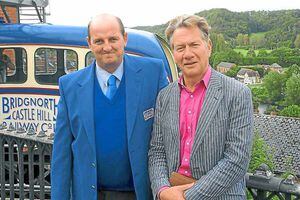
"I suppose I reflect on what my defeat at the general election meant for me. It created an extraordinary opportunity that I had not anticipated.
"I had the opportunity to change career and start again and find something substantially different to do. I think that's an inspiring message for people who need to make a change or who have made a change; it's an encouraging story.
"I've been lucky enough to have two careers. As a kid, politics and broadcasting interested me and I've been fortunate to be involved in both.
"The context is important. I lost my seat in 1997 and everybody knew then that the Conservatives were going to lose the election. When I lost, my career as a Minister was either over or at the very least on the backburner for many years to come. Everybody knew Blair would be in for a very long time. He'd done a very good job and we'd done rather a bad job at that time.
"Even in the moment of my defeat, I felt quite relieved that I wouldn't be required to lead the Conservative Party, which had been reduced to a rump. That would have been no fun. The man who did it, William Hague, had a lousy four years, ending in defeat at the election. My fate would have been no better.
"I happily admit that it took a while to get used to being out on my ear. But the first TV opportunity came along very soon after. I am grateful it did. Lots of people who come out of politics and are at a terrible lose end for a long time. In my case, I found something to do that I thoroughly enjoyed and I've had a great second career."
At Wolverhampton's Wulfrun Hall he'll reflect on the fortuitous changes and how he snatched victory from the jaws of defeat. He'll muse about the way in which the seeds of hope grow in the garden of despair. And he'll hope that fans will be asking him plenty of questions to keep the evening enjoyable.
Michael Portillo – Life: A Game Of Two Halves, Wulfrun Hall, Wolverhampton, Monday, October 31, 7.30pm. For tickets call 0870 320 7000.
Great Continental Railway Journeys, BBC Two, Tuesday, 9pm.
Andy Richardson

